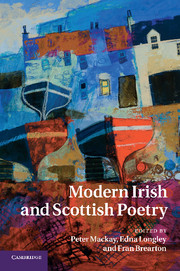Book contents
- Frontmatter
- Contents
- List of contributors
- Acknowledgements
- Introduction
- 1 Swordsmen: W. B. Yeats and Hugh MacDiarmid
- 2 Tradition and the individual editor: Professor Grierson, modernism and national poetics
- 3 Louis MacNeice among the islands
- 4 Townland, desert, cave: Irish and Scottish Second World War poetry
- 5 Affinities in time and space: reading the Gaelic poetry of Ireland and Scotland
- 6 Contemporary affinities
- 7 The Classics in modern Scottish and Irish poetry
- 8 Translating Beowulf: Edwin Morgan and Seamus Heaney
- 9 Reading in the gutters
- 10 ‘What matters is the yeast’: ‘foreignising’ Gaelic poetry
- 11 Outside English: Irish and Scottish poets in the East
- 12 Names for nameless things: the poetics of place names
- 13 Desire lines: mapping the city in contemporary Belfast and Glasgow poetry
- 14 ‘The ugly burds without wings’?: reactions to tradition since the 1960s
- 15 ‘And cannot say / and cannot say’: Richard Price, Randolph Healy and the dialogue of the deaf
- 16 On ‘The Friendship of Young Poets’: Douglas Dunn, Michael Longley and Derek Mahon
- 17 ‘No misprints in this work’: the poetic ‘translations’ of Medbh McGuckian and Frank Kuppner
- 18 Phoenix or dead crow? Irish and Scottish poetry magazines, 1945–2000
- 19 Outwith the Pale: Irish–Scottish studies as an act of translation
- Guide to further reading
- Index
- References
3 - Louis MacNeice among the islands
Published online by Cambridge University Press: 18 April 2011
- Frontmatter
- Contents
- List of contributors
- Acknowledgements
- Introduction
- 1 Swordsmen: W. B. Yeats and Hugh MacDiarmid
- 2 Tradition and the individual editor: Professor Grierson, modernism and national poetics
- 3 Louis MacNeice among the islands
- 4 Townland, desert, cave: Irish and Scottish Second World War poetry
- 5 Affinities in time and space: reading the Gaelic poetry of Ireland and Scotland
- 6 Contemporary affinities
- 7 The Classics in modern Scottish and Irish poetry
- 8 Translating Beowulf: Edwin Morgan and Seamus Heaney
- 9 Reading in the gutters
- 10 ‘What matters is the yeast’: ‘foreignising’ Gaelic poetry
- 11 Outside English: Irish and Scottish poets in the East
- 12 Names for nameless things: the poetics of place names
- 13 Desire lines: mapping the city in contemporary Belfast and Glasgow poetry
- 14 ‘The ugly burds without wings’?: reactions to tradition since the 1960s
- 15 ‘And cannot say / and cannot say’: Richard Price, Randolph Healy and the dialogue of the deaf
- 16 On ‘The Friendship of Young Poets’: Douglas Dunn, Michael Longley and Derek Mahon
- 17 ‘No misprints in this work’: the poetic ‘translations’ of Medbh McGuckian and Frank Kuppner
- 18 Phoenix or dead crow? Irish and Scottish poetry magazines, 1945–2000
- 19 Outwith the Pale: Irish–Scottish studies as an act of translation
- Guide to further reading
- Index
- References
Summary
On 1 January 1950, Louis MacNeice arrived in Athens as Director of the British Institute. It was one those ‘new beginnings’ that his creativity needed. Behind him lay years of distraction at the BBC and months of silence as a poet. Ahead lay the challenge he had set himself in the dedication to Collected Poems (1949) of looking beyond the dazzle of life and finding the past buried in the present. At first, he threw himself into arranging cultural events. He set up a poetry reading that was memorable for ‘his harsh, nasal rendering of “Bagpipe Music”’ (his poem from 1937) and took part in a production of Synge's Playboy of the Western World. Gradually, however, he put his British and Irish involvements into perspective by exploring Athens and the islands: Hydra, Ikaria, Crete. These places and their pasts went into the poetic sequence that was the major product of his stay in Greece. In Ten Burnt Offerings (1952) we read about the Areopagus and Odysseus' Ithaca, as well as Connemara and colonial Madras.
The most extraordinary poem in the sequence – lexically and metrically, at least – deals with the death of Byron during the Greek War of Independence. After visiting the dreary coast where Byron died, MacNeice wrote to a friend: ‘There are some Victorian-Romantic (v. bad) canvasses in Missolonghi Town Hall featuring highly combustive battles with Ibrahim Pasha on a white horse rampant doing the King Billy act.’
- Type
- Chapter
- Information
- Modern Irish and Scottish Poetry , pp. 58 - 86Publisher: Cambridge University PressPrint publication year: 2011



